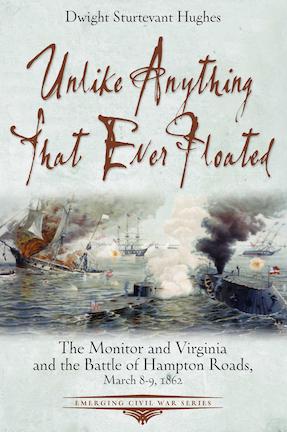The “Emerging Civil War Series” Series: Unlike Anything that Ever Floated

The Format of History: The ECW Series
Although not my first book, Unlike Anything That Ever Floated is the first for the Emerging Civil War Series. This work presented both unique challenges and deep satisfactions deriving from the series format. It also revealed to me distinctions between public and academic history.
Historical scholarship—an endeavor to understand the past, illuminate the present, and envision the future—requires thorough research with skilled composition describing verifiable facts accompanied by reasonable conjecture. However, variations in purpose and audience between public and academic genres call for variants in format.
Academic history seeks to advance the state of knowledge with new or overlooked facts, fresh perspectives, and novel interpretations for a primary audience of fellow academics, subject matter experts, and informed enthusiasts. This is a laudable quest, but one that tends to constrain the range of readership.
Public history pursues these same goals while targeting a broader audience with the principal objective of advancing historical literacy in the populace. It seeks through good story telling to entertain as well as enlighten by applying fiction techniques in narrative style, characteristics not usually evident in purely academic writing.
Narrative histories in standard length and format are popular, reaching more readers motivated to commit the time and effort. The ECW Series, however, goes a step further, pursuing that larger population who would like just a quick hit of history, frequently after a battlefield or museum visit. Series volumes are uniquely short, concise, thoroughly illustrated, and inexpensive with educational captions and appendixes.
Our distinguished editor in chief, Chris Mackowski, likes to call series books a “gateway drug” to more comprehensive study. Those not inclined to longer, more expensive tomes are more likely to grab one on impulse and to consume it. But even if—perhaps particularly if—a series volume does not induce a reader to follow up with additional education, it still encourages understanding of and enthusiasm for history.
As knowledge accumulates and technology advances, human nature is constant. There are no truly original thoughts or previously unfelt feelings; our ancestors have been there many times over. It is often easier to discern the vagaries of the human condition in well-described and unfamiliar historical or cultural contexts. We see more of ourselves in them.
The Civil War is a particularly intense source of understanding concerning the origins and nature of the nation and the people. In this distinctive American milieu, instructive parallels abound between the political and sociological pathologies that spawned that horrible conflict and the present. Continuity and progress are evident but victory is not complete and backsliding is worrisome.
Popular history is especially important as the education establishment appears to be abrogating its responsibility for objective instruction at all levels while public discourse in the “information age” is dominated by gross historical ignorance and politically motivated propaganda. Such trends present serious threats to our constitutional and democratic republic. (See more on this topic in a previous post on “The Future of Civil War History.”)
Focused studies like the ECW Series might not seem to convey deep insight. But competent narrative history engages the reader while illuminating human nature, reducing ignorance, counteracting lies, and inspiring better choices for the future. Loving good stories, we humans have been since the beginning of time transmitting truths through them.
Producing ECW volumes, however, requires ardent focus and concision, more so than traditional-format studies. And they must be precisely delineated in subject matter and time. Every word counts. One encounters full-length histories whose substantive content would fit into a series volume had they eliminated extraneous material, duplication, and the academic proclivity for obscure verbosity.
Finally, the skills of a literary bard are not necessarily coterminous with the expertise of the historian. They require dedicated study and development. The academic history compares to the novel in length but contrasts in form; the ECW Series volume resembles the novella in both length and form.
With its innovative format, the Emerging Civil War Series is a wonderful storehouse of good history and good stories, which might not receive full recognition in some academic circles but does more to advance historical literacy than many scholarly publications. I am proud to have contributed.
————
Unlike Anything that Ever Floated: The Monitor and Virginia and the Battle of Hampton Roads, March 8-9, 1862
by Dwight Sturtevant Hughes
Savas Beatie, 2021
Click here for more about the book, including a book description, reviews, and author bio.

1 Response to The “Emerging Civil War Series” Series: Unlike Anything that Ever Floated